- Home
- J. T. Edson
Cold Deck, Hot Lead Page 2
Cold Deck, Hot Lead Read online
Page 2
With all the others looking at either the lead-punctured wall, or under the table to see what caused the shot, Derringer found himself unobserved. Like a flash he slid the top pasteboard from the deck, reached across and placed it carefully upon Bud’s hole card. So quickly did he move that he completed the addition to the other hand and started to make his apologies before the rest of the players could turn their eyes in his direction. Nor did the extra card show, being placed squarely on top of the vital deuce of spades that gave Bud the only hand to beat Derringer’s full house. Everything now depended on the gang’s reaction when they discovered that their cold deck had somehow gone wrong.
Chapter 2
“I’M SORRY, GENTS,” DERRINGER APOLOGIZED, placing the depleted deck on the table and bending to retrieve the still-smoking cane. “That was damned clumsy of me, but I’ve never known it to be so light on the tri——”
Before Derringer could finish, or any of the gang do more than look around the table, the connecting door flew open and the men from the bar-room entered.
“Damn it, Nabbes, I said no shoo——!” began the owner, then his words trailed off as he saw Derringer seated at the table and clearly not injured in any way.
“It was an accident, barkeep,” Derringer announced. “I knocked my cane-gun on to the floor and it fired. Damned if I knew it had such a light trigger. Anyways, nobody’s hurt.”
Apparently the explanation satisfied the saloon-keeper, for he turned and herded the customers from the room. Derringer then gave his attention to the other players, sensing that his explanation had been at least partially accepted. Yet he felt that he should amplify his reason for possessing such an unconventional walking-cane. His pose as a businessman provided an acceptable excuse.
“I often carry a tidy sum around with me and go places where I might need some protection,” he remarked, laying the cane on the table and reaching into the fob pocket of his jacket. “This comes in real useful then, and takes folks by surprise.”
“You can say that again,” Nabbes breathed, resuming his seat and signalling the others to take their places around the table. Clearly he did not want Derringer thinking about the comment made by the saloon-keeper on entering, for he continued, “What is that thing, anyways?”
“A Remington–Thomas cane-gun,” Derringer replied, taking what looked like a cigar-case from his pocket and placing it open on the table. “I’m sorry for being so clumsy, boys. Only this gun’s never misfired before. Maybe I’d best send it back to the Remington factory and have them look it over when I get home.”
While speaking, he tugged at the claw-and-ball knob, drawing it and the upper section of the casing away from the barrel of the cane. An empty cartridge case flipped out of the open breech as a flat spring-catch snapped up to hold the mechanism in a firing position. Before any of the men could make comment, Derringer took a .38 bullet from the open case and slipped it into the cane’s breech. Sliding the handle and casing back to their original position, he returned the cane to its previous harmless appearance.
“You was walking on that cane,” Ferrely said, a mite accusingly, showing he understood a basic fault of that type of weapon.
“I can’t walk very well without it,” Derringer lied, dipping into the open ammunition case again.
“I thought you couldn’t shoot one with its ferrule plug in,” Nabbes said.
“You can’t with most of them,” Derringer admitted. “But Josh Thomas came up with the answer for Remington.”
With that Derringer showed the others the thing he had taken from the case. It proved to be a piece of cork shaped to plug the barrel-hole of the ferrule. Only the Remington–Thomas cane-gun offered such a satisfactory method of keeping dirt out of the barrel, while still allowing the bullet to be fired immediately. Other such weapons relied upon a wooden tampion which fitted so tightly that it must be removed manually before shooting—failure to do so resulted in at least a burst barrel—or so loosely that it fell out and was lost. Held in place by friction, the cork plug of the Remington–Thomas cane-gun retained its position but could be thrust out of the ferrule by a discharged bullet without risk of damage.
“That’s neat,” Nabbes commented, after Derringer finished reloading and explaining the cane-gun’s virtues. “It’s the first I’ve seen.”
“Let’s play cards!” Bud growled, eager to lay hands on the pot he knew to be his. However, he too found the gun interesting. So much so that he had not examined his hand and made a premature discovery of the extra card it now held. “It’s you to bet, mister.”
“Seeing what’s just happened, don’t you reckon we should call it a dead hand, gents?” Derringer inquired, looking at the others.
“No!”
The word popped out of Bud’s mouth like a cork from a champagne bottle and his eyes remained glued on the money already in the pot. Although Nabbes made a pretense of asking the others, none of them appeared willing to follow Derringer’s suggestion that they declare the game null and void.
“I’d say you’ve a real powerful hand there, Bud,” Derringer remarked. “But there’re too many spades showing for you to have it. So I’ll just start her for a hundred and see how it goes.”
Sound strategy and the course an unsuspecting man might easily follow. Certainly none of the gang showed that they regarded Derringer’s opening bet with distrust.
“I’ll see that and raise the same,” Ferrely announced, making the play one might expect when possessing Derringer’s knowledge of the jack of spade’s whereabouts.
If anything Bud acted too eager and Derringer caught Nabbes flashing the youngster a warning signal. Apparently the slight inclination of the head told Fenn and Throck their course of action, for both folded their hands and quit the pot.
“This’s too hot for me too,” Nabbes remarked, tossing his cards into the deadwood.* “You boys settle it between you.”
“I reckon I’ll just see that bet and raise it again,” Derringer said.
Earlier in the game he had contrived to give the impression of being involved in a business deal with the local railroad supervisor and Wells Fargo agent, hinting that both would be remunerated by his company for their part in influencing the two organizations employing them. In any railroad town, an important company official like the supervisor packed a whole heap of weight. So did the Wells Fargo agent. Enough for a friend, or business associate putting money their way, to make good any complaint he might wish to raise. Even if the marshal received a pay-off from the gang, he would not ignore a complaint from such a person.
It seemed that the gang accepted Derringer’s story, for they showed no sign of giving him cause to complain. With a less influential victim they might use the technique known as “sandbagging”; re-raising between them until lack of money caused him to fold. Derringer’s supposed friendship with Supervisor Deal and Agent Miggers prevented them from making so blatant an attempt on his wealth. Instead, the three men discarded their hands while Ferrely did no more than see the bet. Once more Bud raised, but Derringer could either see the raise or increase on it.
“I reckon I’ll just see that,” Derringer said.
“You lick me, that’s for sure,” Ferrely replied, folding his cards.
“You’ll need that deuce of spades, Bud,” Derringer told the youngster, exposing his third jack.
“And I’ve got it,” Bud replied with a grin, flipping over his hole card. “Two t——”
His words chopped off like they had been sliced by a butcher’s cleaver. While the required deuce of spades landed face up, it slid off the three of diamonds added by Derringer. A silence that could almost be felt dropped over the room, until Derringer broke it.
“That’s two all right,” he admitted as the others stared with bugged-out eyes at the red-spotted addition which had ruined their chances. “Only it makes six cards, which’s one too many.”
Under the rules of the game, holding an extra card gave Bud a dead hand and caused him to forfei
t any hopes he might have of winning the pot. Nor could he blame anybody but himself for the mistake.
Almost a minute ticked by without any comment to Derringer’s words, as the discomforted cheats tried to work out where their carefully arranged scheme had gone wrong. Nabbes felt sure that the three of diamonds had not been accidentally stuck on top of the deuce of spades when he arranged the deck that afternoon. Yet he also failed to see how Derringer had managed to make the addition. There had been no time when their proposed victim was not under observation——
Except when the cane-gun fell to the floor, fired and drew everybody’s attention from the table.
Yet that would mean “Main” suspected them, or had grabbed the opportunity to make sure his full house could not be beaten. Nabbes wondered which it might be; and how he should deal with the situation.
Reaching the same conclusion as their leader, although somewhat slower than he arrived at it, the rest of the gang waited to see what Nabbes wanted them to do. All but Bud, that is. Baffled rage twisted the young man’s face. Once more the chair shot from beneath him and his fingers stabbed toward the Colt in its holster.
“You put th——!” Bud began hotly.
Next moment the young man’s accusation died uncompleted and he froze with his hand not yet touching the gun’s butt. Instead of returning the cane to behind his chair, Derringer laid it across his knees in a more accessible position. At the first sign of Bud’s move, Derringer caught hold of the claw-and-ball handle, then swung the cane so that its muzzle lined at the other’s chest. The table was not wide and Bud saw the deadly ferrule so close to him that it could not miss directing the bullet-ejected cork plug into his body.
“It’s only my leg that’s lame, young feller,” Derringer warned. “So I’m taking it that you didn’t mean what you started to say.”
Shock numbed Bud as he realized the perilous nature of his position. No Western court would convict “Main” for defending himself against an accusation of cheating, followed by the invariable attempt to back the words with hot lead, should he shoot.
And from all appearances “Main” knew how to handle the cane-gun with some skill. Not a suspicious point in itself. The War between the States had taught even Eastern dudes skill in the use of weapons and many a travelling salesman had learned to be nearly as tough or deadly as a trained range country gun-fighter.
Nor could Bud see any sign of help from the rest of the gang. Maybe they wanted to cut in, but could see the danger of such an action. “Main” held the cane-gun with his forefinger on the trigger-stud. Any hostile move or attempt to grab the weapon might cause him to press the stud, and at that range he could not miss. So Fenn Keebles, probably most concerned about Bud’s welfare, Throck and Ferrely sat still and waited for their leader to give a lead as to their actions. They did not have long to wait.
“Take it easy, Julius,” Nabbes said in a placating tone. “Bud spoke out of turn, but it was only because he’s disappointed. Who wouldn’t be? I don’t figure that he meant it.”
“The h——!” Bud started with some heat.
“It was your own fault for not checking the hole card before you started betting,” interrupted Nabbes, scowling at the youngster. “You can’t blame Julius for that.”
“Look here,” Derringer said, resting the cane on the table but not taking his hand from the handle, “if the young feller feels so bad about it, I’m game to split the pot with him.”
A generous offer if the game had been straight; and even under the circumstances it stood to show its maker a good profit. All the gang had bet heavily to keep Derringer in the pot. Apparently the offer relieved the tension, for the other men doubted if a suspicious player would make it.
“Now that’s a real sport talking!” enthused Nabbes, while the rest waited for his reactions to the offer. “Only I don’t think it’s right for us to impose on Julius that ways.”
“I go with Eli on that,” Fenn went on, before the surprised Bud could comment. “Come on, Bud. Show Julius that us Keebles ain’t poor losers.”
Interest in upholding the Keebles family’s honor did not prompt Nabbes to make the suggestion. As Derringer hoped, the little man felt uncertain as to how the extra card reached Bud’s hand. So Nabbes wanted the affair smoothed over to give them a chance to recoup their losses and show a profit without recourse to violence.
Slowly, reluctantly, Bud sank into his chair. “Go on, take it,” he said sullenly. “It’s your pot.”
“Thanks,” Derringer answered, drawing the money toward him and stacking it into a thick pile. “What say you boys let me buy you a drink before the next hand?”
“We can have them sent in,” Nabbes remarked.
“Sure,” agreed Derringer. “But if we go out to the bar, it’ll show those fellers everything’s friendly and that the shot was an accident. That way they’ll not start spreading lies around.”
“Maybe the walk’ll change Julius’ luck, Eli,” Ferrely commented, making Derringer’s point stronger.
“In that case I’m all for going out to the bar,” Nabbes agreed. Then a frown flickered to his face as he saw that Derringer had placed all the paper money into a wallet. “Aren’t you coming back with us, Julius?”
“Sure I am,” Derringer replied, dropping the wallet into his jacket’s inside pocket, then putting the ammunition case away. “But I thought that the bartender’d be sending somebody in here to clean up while we’re at the bar.”
“In this place?” scoffed Nabbes. “Why, we had to clear the cigar butts from last Friday night’s game off the table when we came in this evening.”
“There’s nothing for me to worry about, then,” grinned Derringer, withdrawing the wallet and tossing it on to the table. “I’ll just take the silver along to pay for the drinks.”
“Sure,” Nabbes agreed. “We may as well have something out of you, hey, boys?”
At the bar, Derringer bought a round of drinks. Then he set about lulling any remaining suspicions. He told a couple of gambling jokes and laughed at one Ferrely countered with. When Bud began to show signs of restlessness, demanding that the game be resumed, Derringer remarked that a trip out back was called for. Hoping for a negative answer, he asked if any of the gang wanted to go along. The hope materialized. In fact, the gang welcomed an opportunity to hold discussion without their victim being present. Thinking about the wallet lying on the table, all felt certain that Derringer would return. So they allowed him to leave unescorted.
Probably all the saloon’s customers, and certainly the owner, knew what kind of game Nabbes ran. However, he saw no reason for letting them learn too much about his business. So he stifled unsaid Bud’s query about the appearance of the extra card and led the way into the back room. Gathering around the table, the gang each received more playing money from Nabbes’ reserve. Nabbes’ angry snarl stopped Ferrely opening Derringer’s wallet in a premature attempt to regain some of their losses. If the victim found on his return that somebody had tampered with his wallet, he would pull out of the game fast and yell for the law.
The matter of the extra card came in for heated discussion, with recriminations levelled but no solution reached. Then the gang became aware of how much time had elapsed since their victim went out back. Everything was ready, a second cold deck in Nabbes’ pocket fixed to trim “Main” to the bone when he returned.
Just as Nabbes decided to send Fenn out back to collect their victim, the door opened. Any relief the little man felt died away when he saw who entered. It was the burly deputy who had stopped Ferrely in the street. Ambling across to the table he grinned at the surprised faces. Receiving payment to ignore the game’s existence, he never made an appearance at the saloon’s back room when a victim might be present.
“Not playing, boys?” he asked. “Did the mark get wise and pull out?”
“He’s gone to the john, is all,” Nabbes replied.
“Then it warn’t him I saw headed away from here just now? I figure
d it couldn’t be. Feller I saw didn’t limp at all.”
Knowing that the deputy had not come merely to make casual conversation, Nabbes snatched up the wallet. While looking exactly like the one into which “Main” had stuffed his winnings, the wallet differed in a major respect. Instead of money, it held only sheets of newspaper cut to a suitable size. That meant “Main” knew what kind of game he was bucking and had come prepared with a duplicate wallet. He had made the exchange under the pretense of pocketing his winnings and left a worthless dud so they would raise no objections to his going from the building.
“Where’d you meet him, Lou?” Nabbes gritted, seething with fury but controlling it with an effort.
“At the Golden Spike——”
“He’s not there,” commented the deputy.
Money changed hands before the peace officer parted with the necessary information. In addition to explaining how he had seen Derringer passing and had trailed him to the Talbot Hotel, the deputy promised not to be around when the gang went calling on him. While the price was high, Nabbes knew a failure to pay it would see the deputy sticking close to their victim and protecting him. However, the deputy threw in a piece of information as a bonus. He told how he had visited the trail-end town of Mulrooney to collect a prisoner and had seen their “victim” wearing a deputy marshal’s badge. One name sprang to mind among the deputies who supported the Rio Hondo gun-wizard, Dusty Fog,* as being able to pull off such a trick.
“Frank Derringer!” Ferrely yelped, bristling with indignation as he rounded on the deputy. “Damn it, Barney, you never let on—”

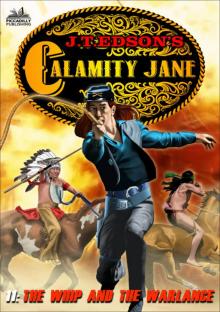 Calamity Jane 11
Calamity Jane 11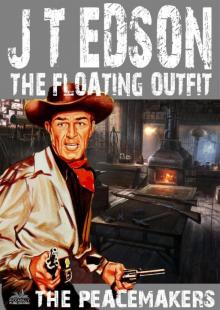 The Floating Outift 33
The Floating Outift 33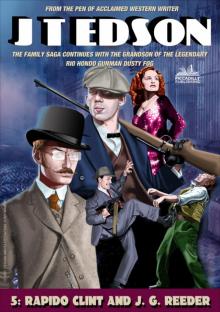 Cap Fog 5
Cap Fog 5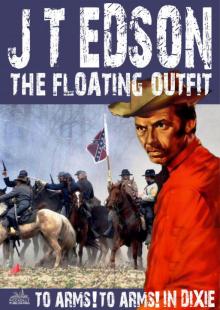 The Floating Outfit 34
The Floating Outfit 34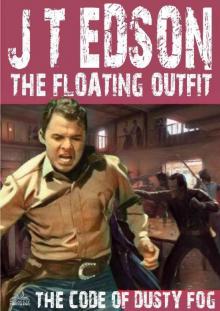 The Code of Dusty Fog
The Code of Dusty Fog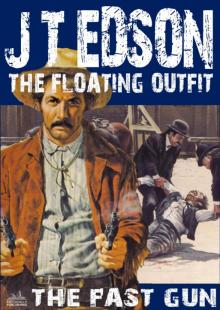 The Floating Outfit 21
The Floating Outfit 21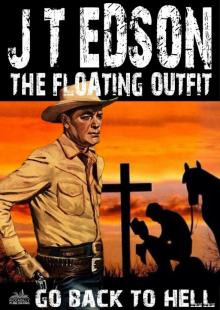 The Floating Outift 36
The Floating Outift 36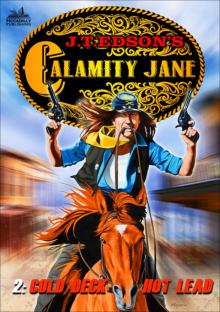 Calamity Jane 2
Calamity Jane 2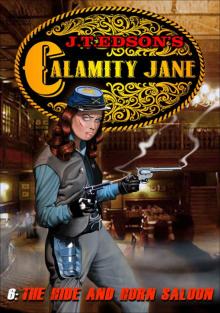 Calamity Jane 6: The Hide and Horn Saloon (A Calamity Jane Western)
Calamity Jane 6: The Hide and Horn Saloon (A Calamity Jane Western)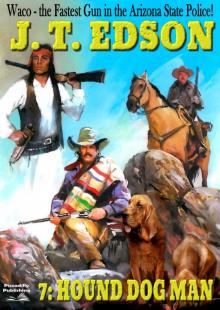 Waco 7
Waco 7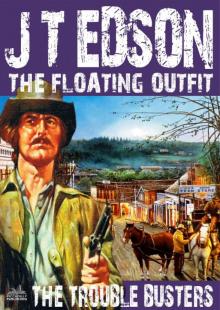 The Floating Outfit 25
The Floating Outfit 25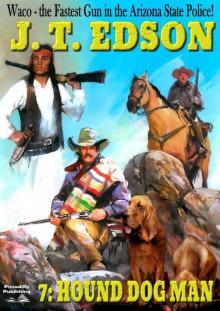 Waco 7: Hound Dog Man (A Waco Western)
Waco 7: Hound Dog Man (A Waco Western)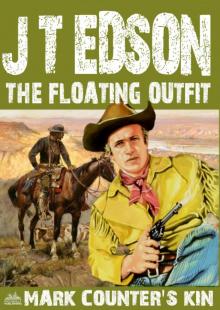 The Floating Outfit 47
The Floating Outfit 47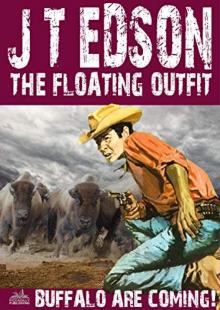 The Floating Outfit 42: Buffalo Are Coming!
The Floating Outfit 42: Buffalo Are Coming!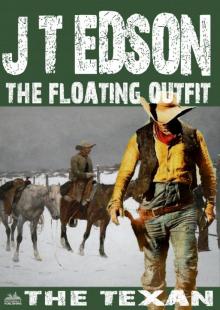 The Floating Outfit 46
The Floating Outfit 46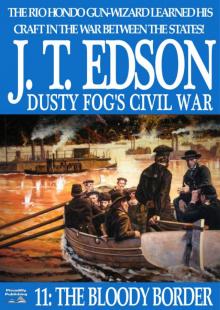 Dusty Fog's Civil War 11
Dusty Fog's Civil War 11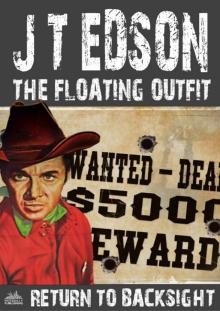 The Floating Outfit 61
The Floating Outfit 61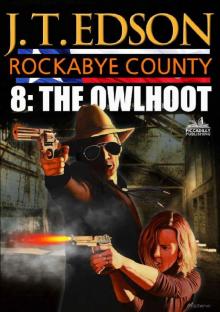 The Owlhoot
The Owlhoot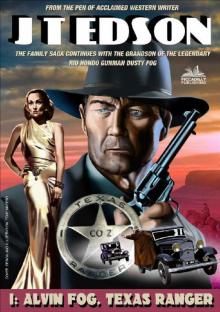 Alvin Fog, Texas Ranger
Alvin Fog, Texas Ranger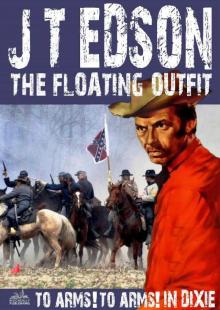 The Floating Outfit 34: To Arms! To Arms! In Dixie! (A Floating Outfit Western)
The Floating Outfit 34: To Arms! To Arms! In Dixie! (A Floating Outfit Western)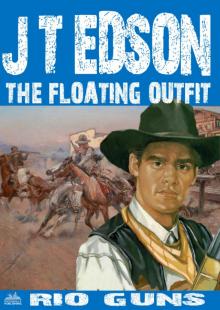 The Floating Outfit 44
The Floating Outfit 44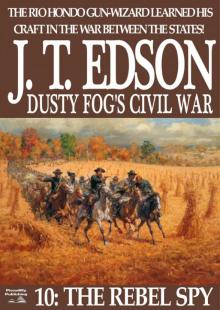 Dusty Fog's Civil War 10
Dusty Fog's Civil War 10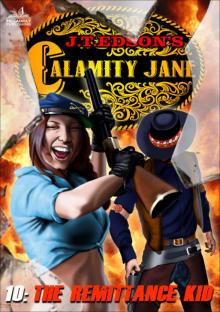 Calamity Jane 10
Calamity Jane 10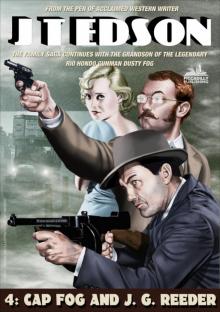 Cap Fog 4
Cap Fog 4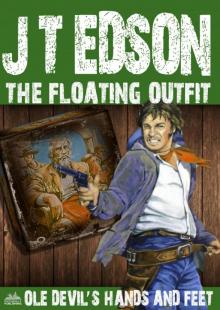 The Floating Outfit 51
The Floating Outfit 51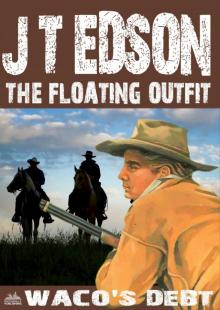 The Floating Outfit 50
The Floating Outfit 50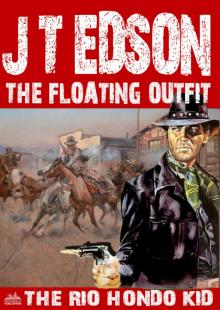 The Floating Outfit 49
The Floating Outfit 49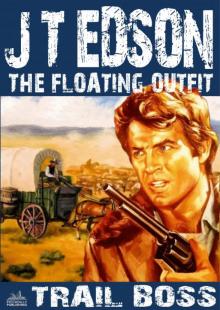 The Floating Outfit 10
The Floating Outfit 10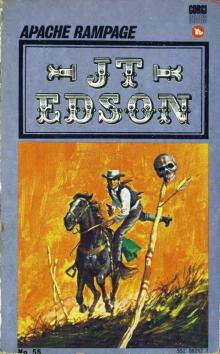 Apache Rampage
Apache Rampage The Floating Outfit 15
The Floating Outfit 15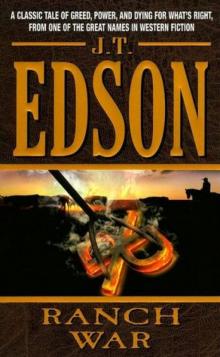 Ranch War
Ranch War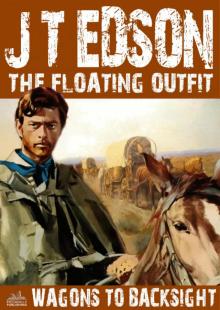 The Floating Outfit 11
The Floating Outfit 11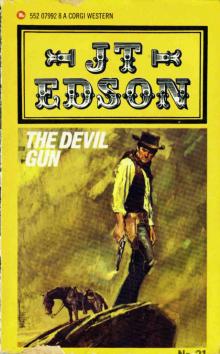 The Devil Gun
The Devil Gun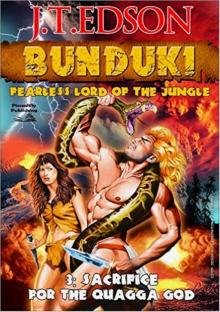 Sacrifice for the Quagga God (A Bunduki Jungle Adventure Book 3)
Sacrifice for the Quagga God (A Bunduki Jungle Adventure Book 3)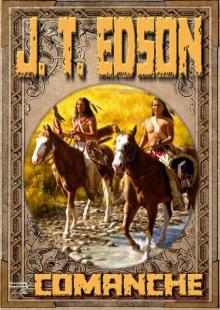 Comanche (A J.T. Edson Western Book 1)
Comanche (A J.T. Edson Western Book 1)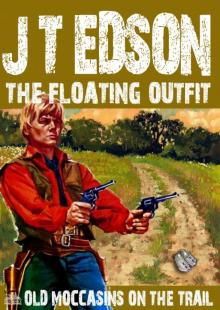 The Floating Outfit 48
The Floating Outfit 48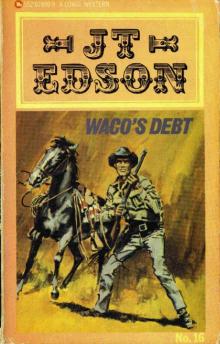 Wacos Debt
Wacos Debt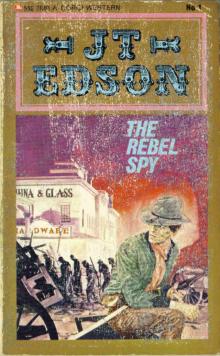 The Rebel Spy
The Rebel Spy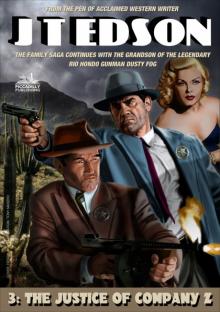 Cap Fog 3
Cap Fog 3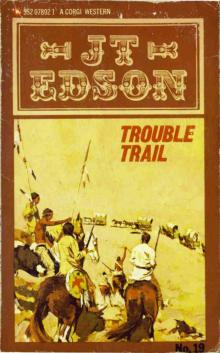 Trouble Trail
Trouble Trail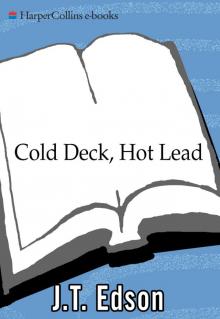 Cold Deck, Hot Lead
Cold Deck, Hot Lead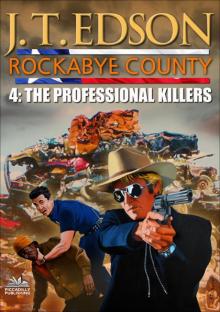 Rockabye County 4
Rockabye County 4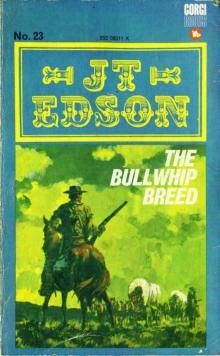 The Bullwhip Breed
The Bullwhip Breed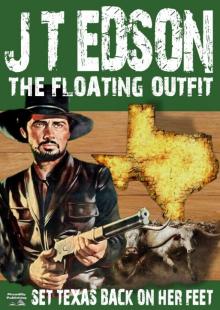 Set Texas Back On Her Feet (A Floating Outfit Western Book 6)
Set Texas Back On Her Feet (A Floating Outfit Western Book 6)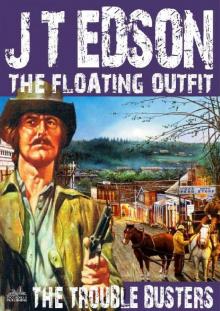 The Floating Outfit 25: The Trouble Busters (A Floating Outfit Western)
The Floating Outfit 25: The Trouble Busters (A Floating Outfit Western) Fearless Master of the Jungle (A Bunduki Jungle Adventure
Fearless Master of the Jungle (A Bunduki Jungle Adventure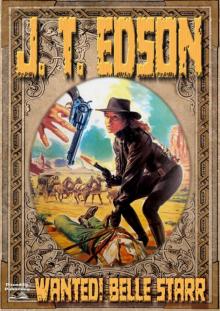 Wanted! Belle Starr!
Wanted! Belle Starr!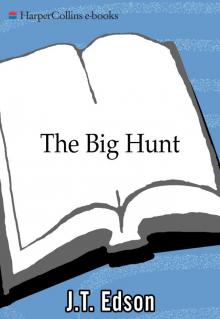 The Big Hunt
The Big Hunt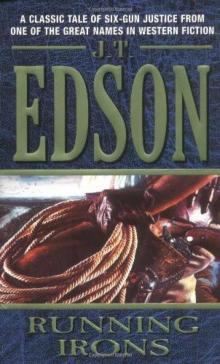 Running Irons
Running Irons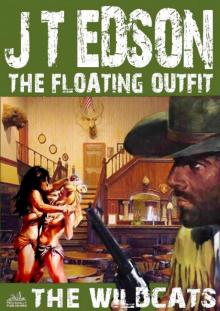 The Floating Outfit 19
The Floating Outfit 19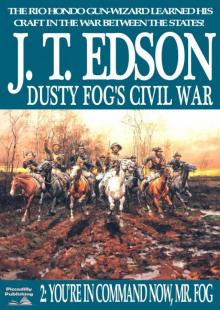 You're in Command Now, Mr Fog
You're in Command Now, Mr Fog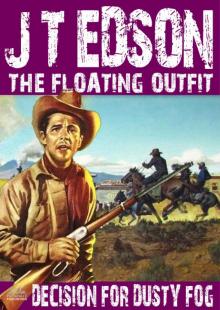 The Floating Outfit 27
The Floating Outfit 27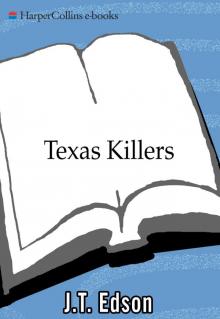 Texas Killers
Texas Killers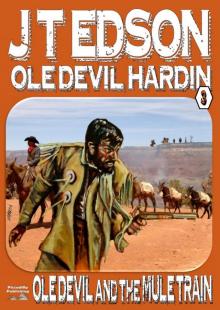 Ole Devil and the Mule Train (An Ole Devil Western Book 3)
Ole Devil and the Mule Train (An Ole Devil Western Book 3)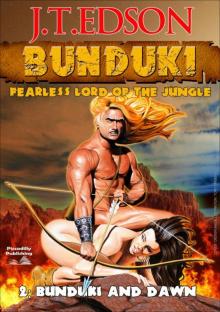 Bunduki and Dawn (A Bunduki Jungle Adventure Book 2)
Bunduki and Dawn (A Bunduki Jungle Adventure Book 2)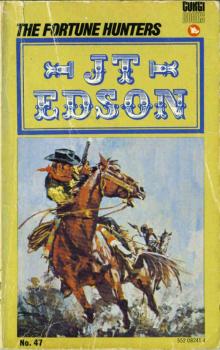 The Fortune Hunters
The Fortune Hunters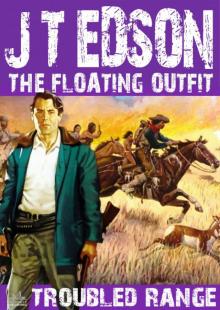 The Floating Outfit 12
The Floating Outfit 12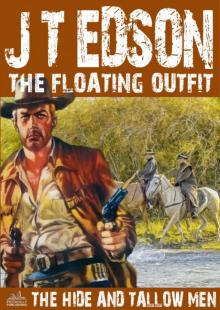 The Hide and Tallow Men (A Floating Outfit Western. Book 7)
The Hide and Tallow Men (A Floating Outfit Western. Book 7)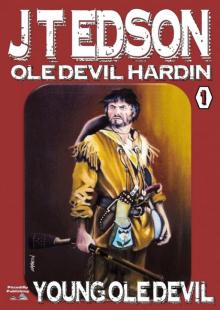 Young Ole Devil
Young Ole Devil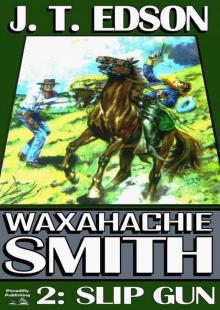 Slip Gun
Slip Gun The Drifter
The Drifter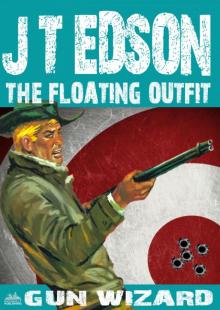 The Floating Outfit 45
The Floating Outfit 45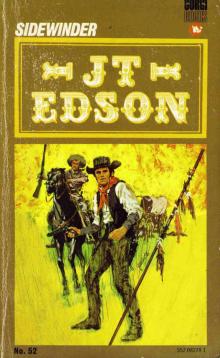 Sidewinder
Sidewinder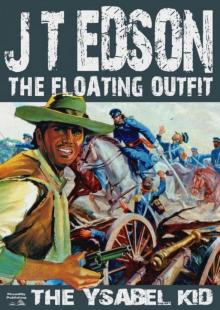 The Ysabel Kid
The Ysabel Kid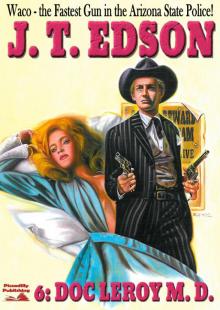 Waco 6
Waco 6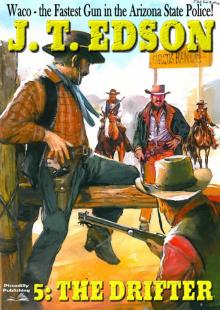 Waco 5
Waco 5 Point of Contact
Point of Contact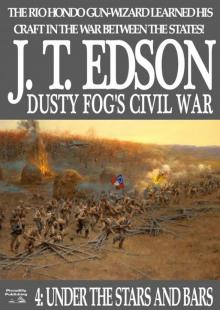 Under the Stars and Bars (A Dusty Fog Civil War Western Book 4)
Under the Stars and Bars (A Dusty Fog Civil War Western Book 4)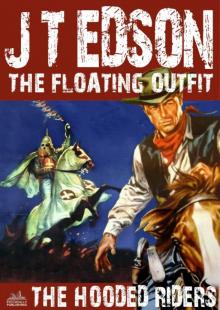 The Floating Outfit 9
The Floating Outfit 9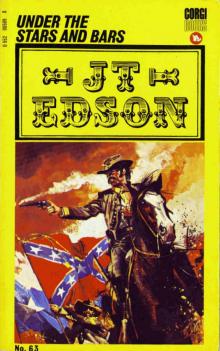 Under the Stars and Bars
Under the Stars and Bars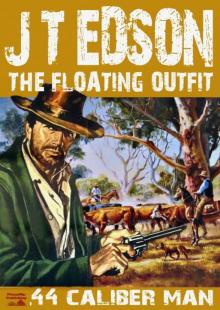 .44 Caliber Man
.44 Caliber Man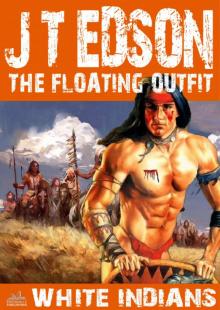 The Floating Outfit 17
The Floating Outfit 17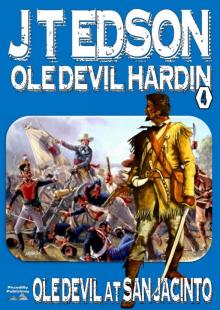 Ole Devil at San Jacinto (Old Devil Hardin Western Book 4)
Ole Devil at San Jacinto (Old Devil Hardin Western Book 4)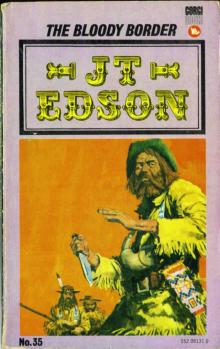 The Bloody Border
The Bloody Border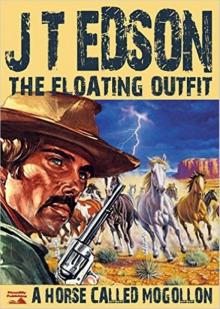 A Horse Called Mogollon (Floating Outfit Book 3)
A Horse Called Mogollon (Floating Outfit Book 3)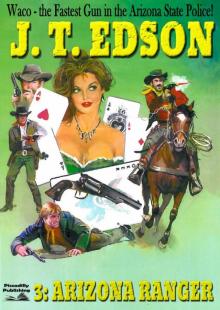 Waco 3
Waco 3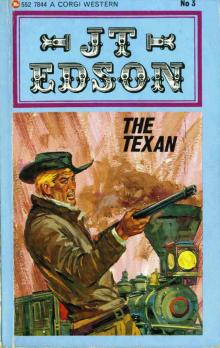 The Texan
The Texan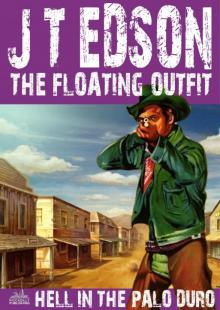 The Floating Outfit 35
The Floating Outfit 35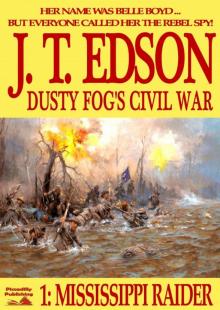 Mississippi Raider
Mississippi Raider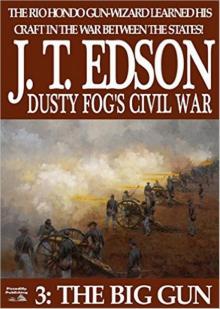 The Big Gun (Dusty Fog's Civil War Book 3)
The Big Gun (Dusty Fog's Civil War Book 3)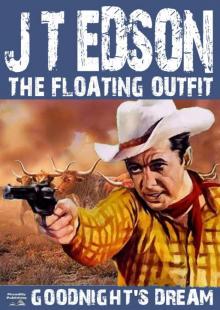 Goodnight's Dream (A Floating Outfit Western Book 4)
Goodnight's Dream (A Floating Outfit Western Book 4) Waco 4
Waco 4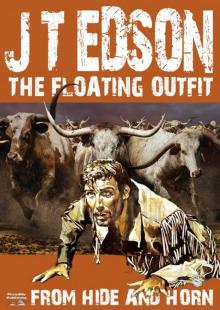 From Hide and Horn (A Floating Outfit Book Number 5)
From Hide and Horn (A Floating Outfit Book Number 5)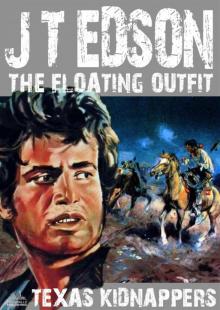 The Floating Outfit 18
The Floating Outfit 18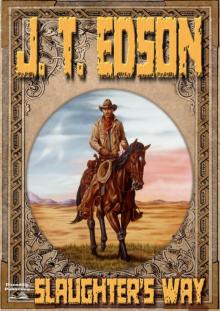 Slaughter's Way (A J.T. Edson Western)
Slaughter's Way (A J.T. Edson Western)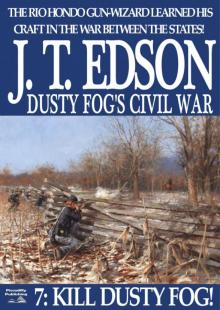 Dusty Fog's Civil War 7
Dusty Fog's Civil War 7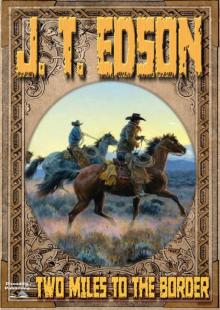 Two Miles to the Border (A J.T. Edson Western)
Two Miles to the Border (A J.T. Edson Western)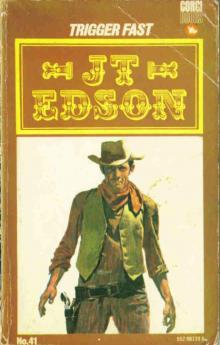 Trigger Fast
Trigger Fast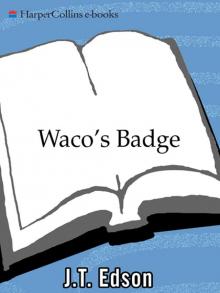 Waco's Badge
Waco's Badge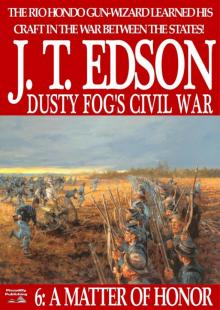 A Matter of Honor (Dusty Fog Civil War Book 6)
A Matter of Honor (Dusty Fog Civil War Book 6)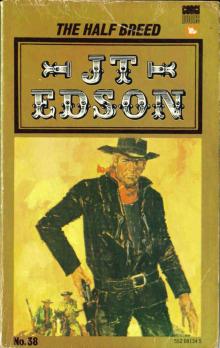 The Half Breed
The Half Breed Bunduki (Bunduki Series Book One)
Bunduki (Bunduki Series Book One)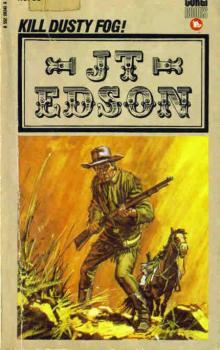 Kill Dusty Fog
Kill Dusty Fog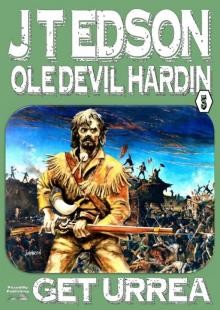 Get Urrea! (An Ole Devil Hardin Western Book 5)
Get Urrea! (An Ole Devil Hardin Western Book 5)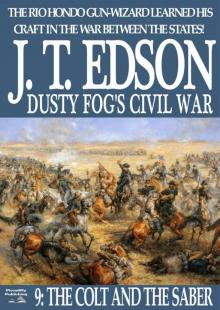 Dusty Fog's Civil War 9
Dusty Fog's Civil War 9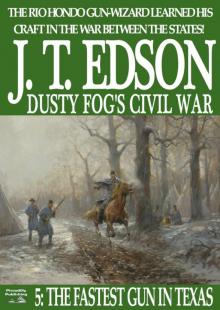 The Fastest Gun in Texas (A Dusty Fog Civil War Book 5)
The Fastest Gun in Texas (A Dusty Fog Civil War Book 5)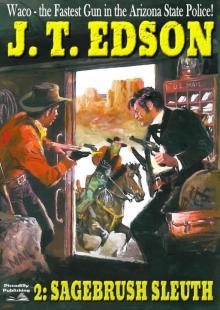 Sagebrush Sleuth (A Waco Western #2)
Sagebrush Sleuth (A Waco Western #2)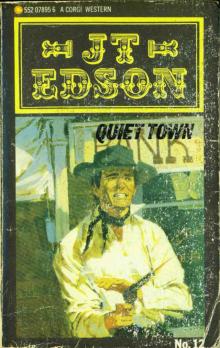 Quiet Town
Quiet Town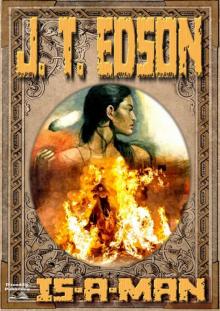 Is-A-Man (A J.T. Edson Standalone Western)
Is-A-Man (A J.T. Edson Standalone Western)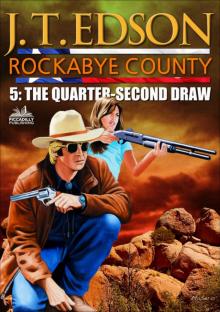 Rockabye County 5
Rockabye County 5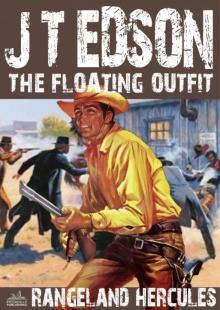 The Floating Outfit 14
The Floating Outfit 14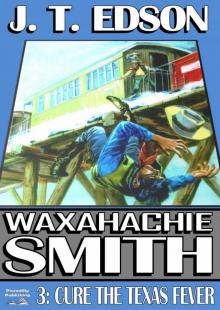 Cure the Texas Fever (A Waxahachie Smith Western--Book 3)
Cure the Texas Fever (A Waxahachie Smith Western--Book 3)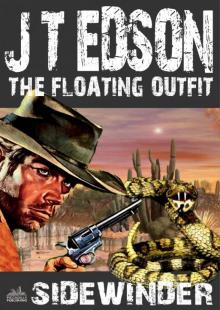 The Floating Outfit 13
The Floating Outfit 13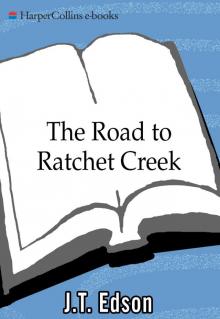 The Road to Ratchet Creek
The Road to Ratchet Creek